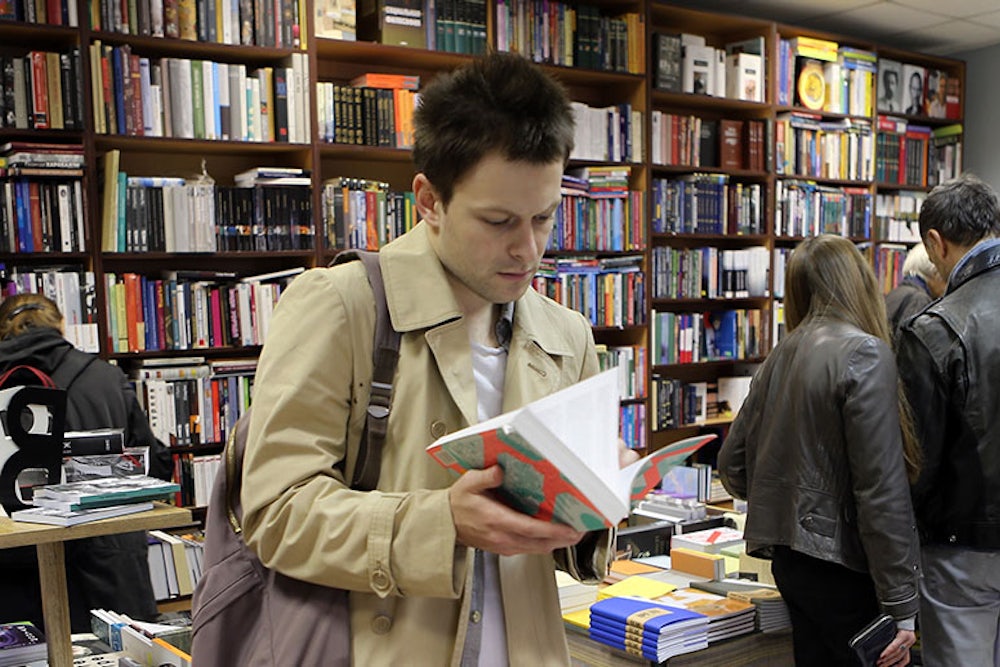Russia's economy may be feeling the strain of the ongoing crisis in Ukraine, but one sector at least appears to be doing OK. In bookshops across the country, a host of new titles has appeared in recent months, slamming American imperialism, debunking anti-Russian historical myths allegedly peddled by the West and justifying Crimea’s “return home.” Publishing—thanks to a recent upsurge in patriotism—is getting by.
Stroll past the bestseller shelves at Moscow’s largest bookshop, Dom Knigi on Ulitsa Novy Arbat, and your attention will likely fall upon The History of Crimea, a 500-page hardback released after Russia annexed the peninsula in March. Touting itself as the “first genuinely academic and objective history of Crimea in the new Russia,” the book contains a prologue by Russian Culture Minister Vladimir Medinsky and is published by Olma Media Group, a company which, according to the New York Times, recently acquired Russia’s largest school textbook publisher, Enlightenment, in a rigged government auction.
[tnr-photo style="centered-inline-with-caption" src="http://wp.newrepublic.com/wp-content/uploads/2014/11/history-of-crimea-.jpeg" width="200" height="298"]The History of Crimea, by the Military-Historic Society of Russia (OLMA Media Group, 2014). From the introduction, by Russian Culture Minister and Chairman of the Military-Historical Society, Vladimir Medinsky: “Millions of our compatriots waited decades for this day, and never lost hope that at some point justice will triumph and Russia will return to [the Crimea]. Our opponents on the international arena, through biased presentation of some facts while blocking out others, tried to paint a distorted version of events.” [/tnr-photo]
You’re also unlikely to walk past the row marked “Foreign Affairs” without being drawn to one of the 2014 releases from the St. Petersburg-based “Piter” publishing house. Bright yellow, with bold black and red lettering spelling out titles like Chaos and Revolution: The Dollar Weapon, Rescuing the Dollar—WAR and Chaos in the Brain: the Information War Against Russia, most of the thin hardbacks that make up the series cost a mere 200 roubles (around $4). “Piter” has been particularly keen to support the career of Nikolai Starikov, a popular blogger and chairman of the ultra-conservative Great Fatherland Party, who has authored at least ten books on the Ukraine crisis this year.

In the “Politics” section, the shelves are stacked with fresh releases on the spreading tide of Ukrainian nationalism and the historic roots of the Russo-Ukrainian brotherhood. A large number of books in the section are devoted to Novorossiya, the state envisioned by separatists in Ukraine’s east.

Pride of place is given to Russia’s Eurasian Revenge, a new book from Aleksander Dugin, the radical pro-Kremlin philosopher who advocates the restoration of the Russian Empire. Russia’s response to events in Ukraine, Dugin argues, is a stand against “global dictatorship” that has pitted the Russian world against the West. (A few texts offering opposing viewpoints on the Ukrainian crisis are available, but they are vastly outnumbered.) The “History of Russia” section at Dom Knigi is headed by the Myths about Russia series, a collection of 2014 releases that advance a new narrative of Russian history, updated to include the events of 2014.

Perhaps the clearest common thread running through this new batch of releases is a renewed interest in the heroes of Russia's past, Joseph Stalin foremost among them. A cannon of texts proposing a second look at the controversial Soviet leader’s role in Russia's history has been published this year, including a revised and updated version of Icebreaker: Who Started the Second World War?, a 1990 book by Soviet dissident Viktor Suvorov, who claims that Stalin promoted Nazi Germany's expansionism in Europe so he could take advantage of the resulting havoc to move in and take control of the continent.

Not even the “Fantasy and Science Fiction” section has escaped the Russian readership’s preoccupation with events in Ukraine. In The Anger of Novorossiya, Donetsk-based fantasy writer Georgy Savitsky envisions a rapid spread across Ukraine of the war thus far confined to the country’s east, and a Russian invasion to protect citizens terrorized by the “Kiev junta.” Other gems in the series include Goodbye America by Aleksander Zolotko; Battlefield Sevastopol: Hero-City vs. NATO by Savitsky; and Lieutenant of the Future by Yuriy Valin, the cover of which features an armed Sergey Shoigu, Russia’s Defense Minister, standing over the capitulating, kneeling figures of Arseniy Yatsenyuk and Oleksander Turchynov, Ukraine’s Prime Minister and parliamentary speaker, respectively.

